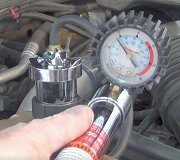The next day I went out to check the levels before I started driving. The oil level was normal, but the coolant was completely empty. I filled it and began taking a longer drive to actually test what was going on. The gauge rose again and I continued driving with the fan on, monitoring to see if the engine started to ACTUALLY overheat. After about 10 minutes and adding some highway driving, my low oil light came on and the gas pedal started to give a little when I pressed it. When stopped at a red light, the car began smoking and I had to pull it over completely and let it sit for a while.
I'm thinking this is a thermostat problem. I will be fixing it myself, I just didn't wanna start tearing stuff apart without knowing exactly what was wrong with it. Hopefully that is enough information to diagnose a problem!
SPONSORED LINKS
Saturday, July 11th, 2015 AT 9:43 AM



